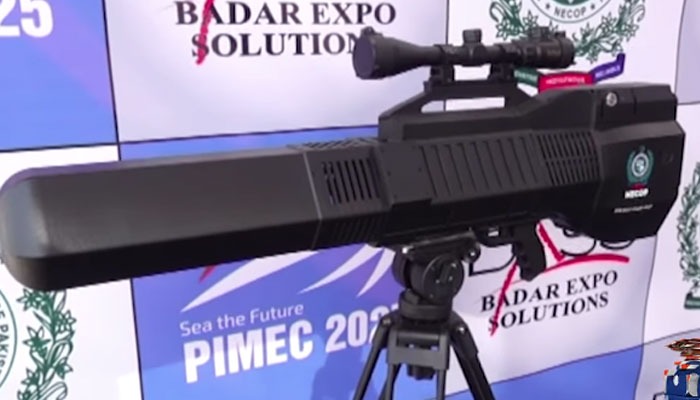KARACHI: A powerful new indigenously developed “Safra Drone Jamming Gun,” capable of disabling hostile “kamikaze” drones from a distance of 1.5 kilometers, has been unveiled at the ongoing Maritime Expo in Karachi.
Developed at the National Electronics Complex, the jamming gun is designed to secure the country’s borders and protect major urban events from aerial threats. Company Manager Hamza Khalid explained that the weapon operates within a 30-degree arc, a range that can be adjusted as needed.
“When a drone enters this range, we can gain control of it or force it to land near us after disabling it,” Khalid stated, highlighting its dual functionality. He emphasized the gun’s critical role in border security, noting that “drones coming from across the border can be easily targeted.”
In response to questions about its capacity, Khalid affirmed that the jamming gun is “fully capable of disabling any number of drones coming from the enemy,” showcasing a significant advancement in Pakistan’s domestic counter-drone technology. The public exhibition of the weapon signals a major step in enhancing national defense capabilities against modern aerial threats.
Last month a shocking drone strike video released by the Indian proxy “Fitna-adl-Khawarij” has sparked outrage, as credible sources confirm the targets were innocent Pashtun civilians in the Khyber Pakhtunkhwa’s merged tribal districts — not military personnel.
According to intelligence sources, the group responsible for the attack has long been operating with direct funding and support from India, using modern weaponry and surveillance technology far beyond the capabilities of local insurgents. The availability of such advanced drone systems points to a well-established supply chain funded by Indian intelligence agency RAW, exposing the scale of India’s proxy war against Pakistan.
The drone strike — which has been circulated across social media platforms by Khawarij sympathizers — once again highlights the group’s reckless tactics and disregard for civilian lives. Security officials note that the group’s lack of training in drone warfare often results in misfires that kill non-combatants, especially in the newly merged districts where densely populated areas are frequently misidentified as military targets.
“Despite clear evidence that these drone strikes are carried out by Khawarij operatives, anti-state elements continue to blame Pakistan Army in orchestrated social media campaigns,” said one senior intelligence official, speaking on condition of anonymity.





